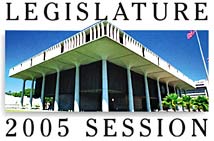Cigarette tax bill
passes Senate
The House considers a measure
to increase taxes on cigarettes
to $2.60 a pack by 2008
The nicotine rush of a cigarette bought in Hawaii could soon be among the most expensive smokes in the nation if a new measure before the Legislature is passed this year.
|
|
Now they are looking to almost double the tax over the next three years.
Under a bill passed by the Senate and currently being considered by the House, the tobacco tax would go from the current 7 cents per cigarette up to 9 cents next summer, or $1.80 per pack. Increases over the next two years would put the tax at 11 cents per cigarette, or $2.20 per pack, in 2007 and 13 cents per cigarette, or $2.60 per pack, in 2008.
The end result would be today's $5 pack of cigarettes costing $6.20 in three years.
If that figure seems prohibitively expensive, it's meant to be.
"The reason that a number of states have adopted this as a strategy is because they've seen how they've been able to keep people from smoking and encourage people to give up the habit," said Maui Sen. Rosalyn Baker, author of the bill and chairwoman of the Senate Committee on Health.
In recent years, legislatures across the nation have looked to taxes on cigarettes to help smokers quit and prevent would-be smokers from taking their first puff.
Money from the new Hawaii tax would be distributed to the state's general fund, as well as prevention programs -- with 50 percent going to the Tobacco Prevention and Control Trust Fund.
Even tobacco-producing states have begun to follow suit, with Virginia lawmakers last year upping that state's tax from 2.5 cents to 30 cents per pack over two years and Kentucky's lawmakers this month approving a raise of their state's tax from 3 cents -- the lowest in the nation -- to 27 cents per pack.
Hawaii's latest tax increase on cigarettes was the lowest of 11 states to raise their taxes that year, said Bertrand Kobayashi of the American Lung Association of Hawaii.
If enacted into law, this year's bill would make Hawaii's tax rate on cigarettes the fourth highest in the nation, he said.
While public education is important to preventing smoking, it is less effective than raising the price of cigarettes because education can reach only a few people who may or may not be inclined to quit, Kobayashi said.
"But the price of cigarettes affects all smokers, not just those who happen to hear the public health message," he said.
Enjoying a drag on a lunchtime smoke in Downtown Honolulu recently, Rohan Jetley agreed. If cigarettes were to cost more, Jetley said he would smoke less.
But even the highest taxes would not deter the truly addicted smoker, who will probably simply turn to online tobacco outlets, he said.
"People are always going to try to find loop holes around it," Jetley said.
Online sales to consumers, however, became illegal last summer when a new law went into effect that bans cigarette makers from shipping tobacco to anyone but those licensed to sell in the state.
Rep. Bud Stonebraker (R, Kalama Valley-Hawaii Kai) said he worries that increasing taxes might have an unexpected consequence of boosting the sales of black market cigarette sellers.
Taxing as a means of prevention is also a ruse, Stonebraker said.
"When the government raises taxes they're doing it purely for their own benefit," said Stonebraker, a nonsmoker who patently opposes tax increases of any stripe.
Stonebraker had voted on the floor against a similar measure that failed to move ahead in the House. He said he and most of the House Republicans will vote against the Senate's version of the bill.
"One of these days we're going to have to realize that the government is not the parent of people," Stonebraker said.
And if the lawmakers are against smoking they have the option to make it illegal, he said.
That's an idea House Health Committee Chairman Dennis Arakaki said he would be willing to entertain.
Arakaki said he and his vice chairman, Rep. Josh Green (D, Keauhou-Honokohau) are shooting to make Hawaii tobacco-free by 2010.
The current measure could have some hurdles, however. Given the sunny economic outlook of the state, legislators will be less likely to approve a new tax, said Arakaki (D, Alewa Heights-Kalihi).
But the preventive aspect of the bill might be its saving grace, he said.
"With cigarettes we know that it's poison ... I think anything we can do to keep people from poisoning themselves we should do," Arakaki said.
[News] [Business] [Features] [Sports] [Editorial] [Do It Electric!]
[Classified Ads] [Search] [Subscribe] [Info] [Letter to Editor]
[Feedback]

